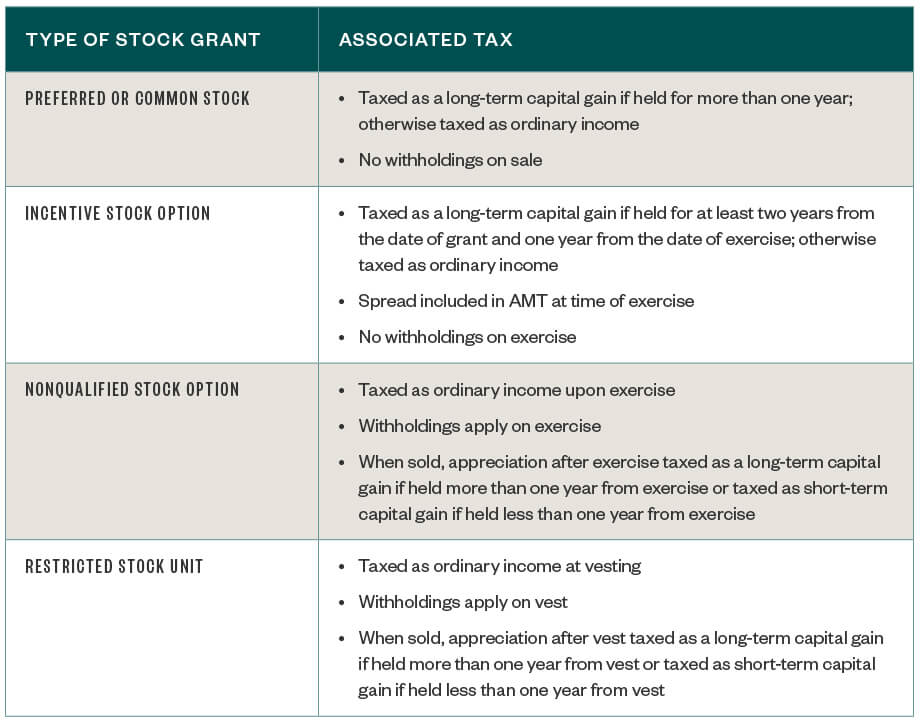
09/12/ · Under the current employee stock option rules in the Income Tax Act, employees who exercise stock options must pay tax on the difference between the value of the stock and the exercise price paid. Provided certain conditions are met, the employee can claim an offsetting deduction equal to 50% of the taxable benefit 15/02/ · Employee stock options are a great incentive that can be embedded within many compensation packages. Often, employees are able to buy the company stock at a discount, providing a great opportunity 01/02/ · Tax point for stock option plans • Regarding stock options, there are three crucial time points taken into account for determining income tax treatment: 1) the grant date, 2) the exercise date, and 3) the time of transfer of shares due to sale, donation, parental grant, inheritance
Topic No. Stock Options | Internal Revenue Service
Employee stock options are a great incentive that can be embedded within many compensation packages. Often, employees are able to buy the company stock at a discount, providing a great opportunity to accumulate wealth if the stock performs well. But the other piece of the puzzle is trying to grasp how taxes for employee stock options work. It could easily become a nightmare if you've never dealt with stock options before. Here are a few employee stock options tax treatment to take the confusion away so you can maximize the potential of this incredible work benefit.
There are two main types of stock options that you could receive as part of your compensation gift: incentive stock options and nonqualified stock options. The main difference between these two is how they are treated for tax purposes when employee stock options tax treatment exercise the options. Incentive stock options ISOsalso known as statutory stock options, are granted under a stock purchase plan.
However, nonqualified stock options NSOs are granted without a specific type of plan and are often referred to as nonstatutory stock options. As we'll see below, NSOs don't qualify for the same tax benefits that ISOs receive. When you have employee stock options, employee stock options tax treatment, there are three special occasions you need to be aware of: the date your company granted you the options, when you exercised them, and how long you hold the shares you receive on exercise before you sell them.
These moments play an important role in your tax calculation. Most of the time, there is a vesting schedule tied to your employee stock options. Simply put, you cannot tap into your stock option benefits until you've been at your company for a certain period of time. After you are vested, then you can exercise the options at any time before they expire.
Incentive stock options are simpler than nonqualified stock options from a tax perspective. Employees who have ISOs don't have to worry about taxes when they receive a stock option grant or exercise the options. The order of operations works like this: You receive a stock option grant and then you exercise the options when you are eligible and ready to do so.
After you exercise your options, then you'll have to make the ultimate decision: When do I sell my stock? Your other option: exercise your options in one period and sell your stocks later. It's important to have a tax strategy when exercising NSOs because you'll be hit with a tax twice, and it can get a bit complicated.
First, you'll typically have to pay employee stock options tax treatment income taxes when you exercise the options.
You must pay the difference between what you paid for the stock the exercise price and the fair value of the shares when you exercised them. The IRS considers this as compensation income even though you haven't actually made any money.
Then, you'll pay capital gains tax if you sell the shares at a profit. If the sale results in a loss, you'll report a capital loss for the difference between your tax basis and what you received. You'll either pay short-term or long-term capital gains taxes depending on how long you've held the stock. Although ISOs are typically seen as a tax savior in comparison to NSOs, you'll have to consider the alternative minimum tax AMT if you are a high earner.
Taxes for employee stock options can be overwhelming. If you have no idea what you're doing when you file your taxesseek out a professional to make the process less draining.
Discounted offers are only available to new members. Stock Advisor will renew at the then current list price. Investing Best Accounts, employee stock options tax treatment. Stock Market Basics. Stock Market. Industries to Invest In. Getting Started. Planning for Retirement. Retired: What Now? Personal Finance. Credit Cards. About Us. Who Is the Motley Fool? Fool Podcasts. New Ventures, employee stock options tax treatment.
Search Search:. Charlene Rhinehart, CPA TMFDividendQueen. Feb 15, at AM. Author Bio Charlene Rhinehart is a personal finance writer and former financial analyst. Her goal is to help more individuals build a stock portfolio that's bigger than their shoe collection.
With a background in taxes and pageantry, Charlene is always ready to sprinkle a bit of glam and happiness into her work to help individuals achieve their goals, employee stock options tax treatment.
Image source: Getty Images. Join Stock Advisor Discounted offers are only available to new members. Stock Advisor launched in February of Next Article. Prev 1 Next.
Employee Stock Options: Taxes
, time: 2:59How Are Employee Stock Options Taxed? | The Motley Fool

09/03/ · Employee Stock Purchase Plan - After your first transfer or sale of stock acquired by exercising an option granted under an employee stock purchase plan, you should receive from your employer a Form , Transfer of Stock Acquired Through an Employee Stock Purchase Plan under Section (c). This form will report important dates and values needed to determine the correct 09/12/ · Under the current employee stock option rules in the Income Tax Act, employees who exercise stock options must pay tax on the difference between the value of the stock and the exercise price paid. Provided certain conditions are met, the employee can claim an offsetting deduction equal to 50% of the taxable benefit 01/02/ · Tax point for stock option plans • Regarding stock options, there are three crucial time points taken into account for determining income tax treatment: 1) the grant date, 2) the exercise date, and 3) the time of transfer of shares due to sale, donation, parental grant, inheritance
No comments:
Post a Comment